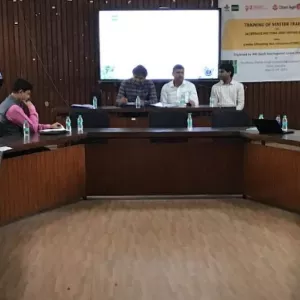IRRI holds training on revolutionary water-saving technology for sustainable rice production
The International Rice Research Institute (IRRI) South Asia Regional Centre (ISARC) organized a training and hands-on demonstration to acquaint participants with alternate wetting and drying (AWD) technology for irrigation water management at Chaudhary Charan Singh Haryana Agriculture University (CCSHAU) on 11-12 May. Around 30 master trainers from Jind and Fatehabad Districts in Haryana participated in the program under the Credit

IRRI holds training on revolutionary water-saving technology for sustainable rice production
The International Rice Research Institute (IRRI) South Asia Regional Centre (ISARC) organized a training and hands-on demonstration to acquaint participants with alternate wetting and drying (AWD) technology for irrigation water management at Chaudhary Charan Singh Haryana Agriculture University (CCSHAU) on 11-12 May.
Around 30 master trainers from Jind and Fatehabad Districts in Haryana participated in the program under the Credit Offsetting Rice Emissions (CORE) Project funded by Deutsche Gesellschaft für Internationale Zusammenarbeit (GIZ).
CCSHAU Extension Education Director Balwan Singh Mandal emphasized the importance of addressing climate change and water saving for future generations and sustainable agriculture and encouraged the participants to promote AWD technology. AWD technology, developed by IRRI, saves up to 30% of water, promotes good root anchorage, and reduces methane emissions in rice cultivation by 48%. The technology is most useful in Haryana, Punjab, and Western Uttar Pradesh.
Dr. Ashok Kumar Godra, Associate Director (Training), and Dr. Suresh Kumar, Joint Director (Crop) at CCSHAU, discussed how direct seeding technology and AWD in rice cultivation will be helpful in view of labor shortage and water scarcity. They suggested making use of these innovations as well as training more farmers including women.
Dr. Vikram Patil highlighted the benefits of AWD technology and the CORE Project. Dr. Proloy Deb highlighted water management and current challenges. Dr. Ashish K. Srivastava presented the importance of nutrient and water management. Mr. Vipin Kumar elaborated on the installation of pani pipe, irrigation management, and other technical aspects, followed by the role of extension systems for the promotion of AWD in Haryana. Gender sensitization sessions were also conducted by Dr. Sohail Khan and Ms. Sejal from U.N. Women.
AWD is one of the effective technologies for conserving water resources, and reducing GHG emissions without yield penalty,…

